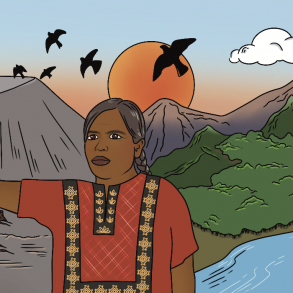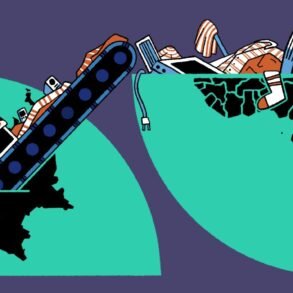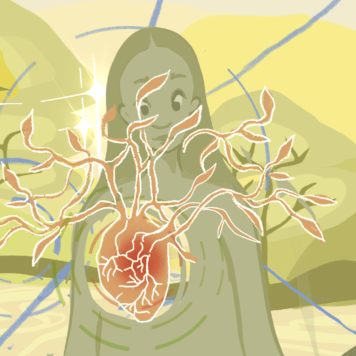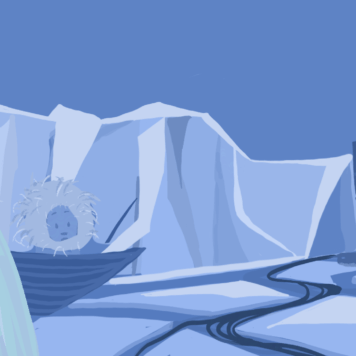One question that keeps coming up, no matter what space or context I am in, is: “are you an optimist or a pessimist?” Well the answer really is … neither! And it’s this binary, and their perceived lack of interplay when it comes to discussing solutions to the climate crisis, that I hope to challenge in this article.
Whilst optimism takes the approach of “it will definitely work out/change will magically appear”, pessimism is based on the idea that the fight is already lost, so “why bother”. The approaches are different, and there are of course also more subtle, less absolute narratives for both – and yet the outcomes are the same. More often than not, it leads to the opting-out of taking action; denial of what is happening or the denial of opportunities for change, and the general justification for inaction. This can be seen on an individual and collective basis and points to the fact that these narratives are tools of white supremacy, patriarchy and capitalism, not only in undermining the power of peoples’ action but promoting the power and privilege hoarding of those benefiting from existing unjust systems.

“This is how it’s always been done” or “it won’t happen in our lifetime” are just another two examples of normalising crises and suppressing the envisioning of liberated and just futures by those profiting from the climate crisis, racism, gender-based violence and all other forms of oppression.
In the climate movement, this is often experienced as some promoting the idea that all is lost already, whilst others try to down-play the realities of the climate crisis, focusing on too-slow too-small climate solutions. There exists also somewhat of a competition between the two approaches in who understands the climate crisis better, and has the right climate actions.
I don’t think this is helpful at all, as we get so focused on who is right or wrong, shaming others for their approaches, and simultaneously dismissing those at the frontlines of the climate crisis, by downplaying the crisis or offering hopelessness.
I also reject this idea that being an ‘optimist’ focuses on ‘light-hearted’ news or being a ‘pessimist’ focuses on ‘destruction’, as this binary framework is yet another reduction of what my heart and mind are capable of. Moreso, these narratives uphold the systems of oppression that operate on a scarcity mindset that there is not enough for everyone, which I know is untrue as my heart has no capacity limit for justice-centred futures.
However, I do know that both this realisation, and acting upon it, takes a great deal of (un)learning. This is where I’d like to propose the alternative framework: hope.
No, not the mainstream idea of hope as the “expectation of fulfilment or success” (Merriam Webster), but rather hope as a practice. Hope as the acknowledgement of the different states of the world and thus complexity, and rather than looking away, leaning into what is there, looking the storm right in the eye and facing what is, whilst imagining what could be: the range of possibilities. Hope as a practice that calls on our responsibility to show up, constantly, and act for change no matter how big the chance of success, but just because it is the right thing to do.
I think it is also important to acknowledge that, in many ways, the theorising of and the ability to choose hope is based on personal and collective privilege that those at the frontlines fighting different causes and oppressive systems simply do not have.
Compared with the binary framework of optimism and pessimism which is a much more individual-centred approach, focusing on mindset, hope is based on and for the collective. This is due to the fact that no one individual can face everything alone, understand the many different lived experiences/realities in this world, or can imagine the many different futures possible.
Hope for the collective also means that it is not yours or mine to carry everything by ourselves, but neither do any of us have the right to abandon the work. Whilst we all have different capacities, skills and approaches, it is the responsibility of the collective to address the storms we are in, and you and I are part of that collective.
This is particularly important when we consider how to move forward in light of the recent too-close election loss of Trump, or the few recent UK government U-turns on hostile environment policies. Whilst they are small, yet incredibly important changes, literally saving lives in many cases, they still operate in the toxic systems that produced the crises in the first place. They are points of reference, or visualisations of the undercurrents, behaviours and ideologies, within our society. They are small wins against current polarisations, divisiveness, hatred and prejudice – and yet it should have never gotten this far.
What for me however does stand out is that these wins were achieved by people organising at local and community level, despite the odds being against them. This was hope as practice, playing out in real life. From prominent figures like Marcus Rashford organising for free school meals in the UK, to BIPOC community organising to defeat Trump in the US, along with the mutual aid and neighbourhood projects that have sprang up across the world during this pandemic – these are the spaces where I know that another world is possible, but only if we start acting together for her.
Hope is collective action, as well as collective responsibility.
The next time someone asks me if my glass is half full or half empty, I will refer to Charlene A. Carruthers’ words; “Imagine that there are buckets and that one of those really big water towers has to be filled. Each of us, and I mean each of us, has a contribution to make toward filling it. Everyone has a role, and no one person can begin to do it all.”
And that is hope for me, the practice, the call to action, the acknowledgement of the complexity of this world, of your heart, and of the collective imagination and fight for justice-centred futures.
I know I am not the only one overwhelmed by all the feelings regarding the states of the world. And yet, I truly believe that these feelings, the heartache, the pain as well as the joy, are the catalysts for change and the proof that we know the present is inhabitable and therefore, change is inevitable – if we act on it.

See more of Olivia’s work on her instagram
Find out more about Josephine’s work on her instagram and website






